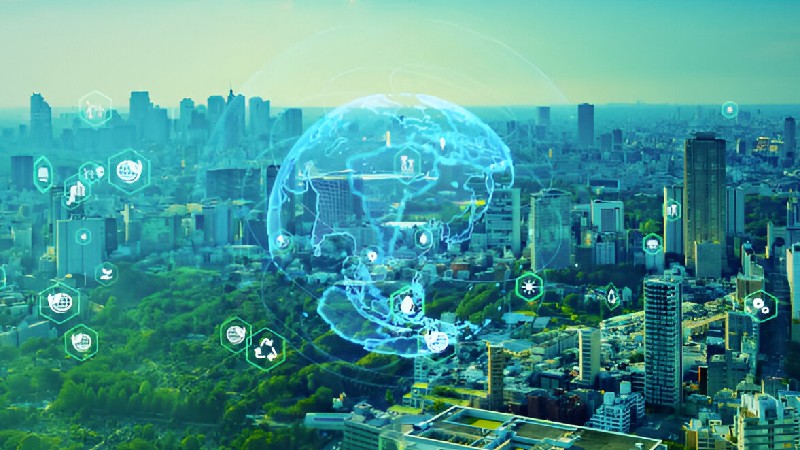Carbon neutrality is a term that’s gaining significant traction in the fight against climate change. It refers to achieving a state of net-zero carbon dioxide (CO2) emissions by balancing the amount of CO2 released into the atmosphere with an equivalent amount removed.
While the concept is widely discussed, one crucial aspect that often gets overlooked is the role of artificial intelligence (AI) in accelerating the journey towards carbon neutrality.
The Urgency of Carbon Neutrality
Before we explore the role of AI, it’s crucial to understand why carbon neutrality is so critical. The excessive accumulation of greenhouse gases, primarily CO2, in the atmosphere is causing global warming and its associated consequences – rising sea levels, extreme weather events, and disruptions to ecosystems.
To prevent the most catastrophic impacts of climate change, the international community, through agreements like the Paris Agreement, has set ambitious goals to achieve carbon neutrality by mid-century. This requires a rapid and comprehensive transformation of our energy systems, industries, and lifestyles.
AI as a Catalyst for Carbon Neutrality

AI, with its ability to analyze vast amounts of data, identify patterns, and make predictions, is uniquely positioned to accelerate the transition towards carbon neutrality. Here’s how:
Optimizing Energy Consumption
- Smart Grids: AI can optimize energy distribution and consumption in smart grids by predicting demand, identifying inefficiencies, and integrating renewable energy sources. This leads to reduced energy waste and lower carbon emissions.
- Building Management: AI-powered building management systems can optimize heating, cooling, and lighting based on occupancy patterns and weather conditions, significantly reducing energy consumption in buildings.
- Industrial Processes: AI can analyze data from industrial processes to identify energy-saving opportunities, optimize production efficiency, and reduce waste, leading to lower carbon emissions.
Revolutionizing Transportation
- Autonomous Vehicles: AI-powered autonomous vehicles have the potential to optimize routes, reduce congestion, and promote fuel efficiency, leading to lower emissions from transportation.
- Traffic Management: AI can analyze traffic patterns and optimize traffic flow, reducing idling times and fuel consumption.
- Electric Vehicle Management: AI can optimize charging schedules for electric vehicles, maximizing the use of renewable energy sources and minimizing strain on the grid.
Accelerating Carbon Capture Technologies
- Carbon Capture and Storage (CCS): AI can optimize CCS processes by identifying ideal storage locations, monitoring CO2 migration, and improving capture efficiency.
- Direct Air Capture (DAC): AI can enhance the efficiency and cost-effectiveness of DAC technologies by optimizing capture processes and identifying optimal locations for deployment.
Enabling Sustainable Manufacturing and Consumption
- Circular Economy: AI can facilitate the transition to a circular economy by optimizing resource utilization, reducing waste, and promoting recycling and reuse.
- Sustainable Supply Chains: AI can analyze supply chain data to identify carbon hotspots, optimize logistics, and promote sustainable sourcing practices.
- Consumer Behavior: AI can analyze consumer behavior patterns to promote sustainable choices and encourage the adoption of low-carbon lifestyles.
Enhancing Climate Modeling and Prediction
- Climate Modeling: AI can improve the accuracy and efficiency of climate models by analyzing vast datasets and identifying complex climate patterns.
- Extreme Weather Prediction: AI can enhance the prediction of extreme weather events, enabling better preparedness and mitigation efforts.
Real-Life Examples of AI for Carbon Neutrality
- Google: Uses AI to optimize energy consumption in its data centers, reducing energy use by 30%.
- Microsoft: Committed to becoming carbon negative by 2030, leveraging AI to track and reduce emissions across its operations and supply chain.
- IBM: Developed an AI-powered platform to help cities optimize traffic flow and reduce emissions.
- CarbonCure: Uses AI to optimize the injection of CO2 into concrete, reducing the carbon footprint of construction materials.
Challenges and Considerations
While AI offers tremendous potential for carbon neutrality, there are challenges and considerations:
- Data Availability and Quality: AI algorithms rely on large datasets, which may not always be readily available or of sufficient quality.
- Ethical Considerations: AI systems should be developed and deployed in a responsible and ethical manner, ensuring fairness, transparency, and accountability.
- Energy Consumption of AI: AI systems themselves can consume significant amounts of energy, requiring careful consideration of their environmental impact.
The Future of Carbon Neutrality with AI
AI is poised to play an increasingly important role in the journey towards carbon neutrality. As AI technologies continue to evolve and mature, we can expect even more innovative applications that will drive emissions reductions and accelerate the transition to a sustainable future.
By embracing AI as a key enabler, we can unlock new possibilities for achieving carbon neutrality and creating a healthier planet for generations to come.
FAQs
Q: What is the difference between carbon neutral and net zero?
A: While often used interchangeably, there is a subtle difference. Carbon neutrality typically refers to balancing CO2 emissions, while net zero encompasses all greenhouse gases.
Q: How can AI help individuals reduce their carbon footprint?
A: AI-powered apps can track your carbon footprint, provide personalized recommendations for reducing emissions, and connect you with carbon offsetting projects.
Q: What are the biggest challenges to achieving carbon neutrality?
A: The biggest challenges include transitioning to renewable energy sources, decarbonizing heavy industries, and changing consumer behavior.
Q: How can I learn more about AI and its role in sustainability?
A: There are numerous online resources, courses, and publications available on this topic. You can also explore initiatives like the AI for Good Foundation and the Global Partnership on AI.
Q: What is the role of governments in promoting AI for carbon neutrality?
A: Governments can play a crucial role by investing in AI research and development, creating supportive policies, and promoting collaboration between stakeholders.
By actively exploring and implementing AI-powered solutions, we can accelerate the transition towards carbon neutrality and create a more sustainable future for all.

